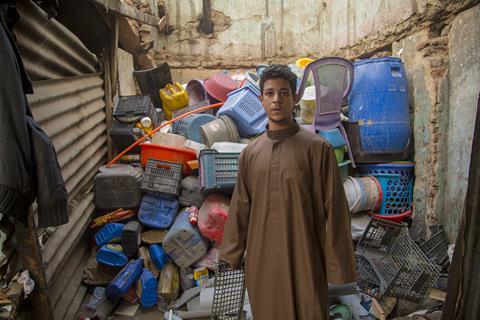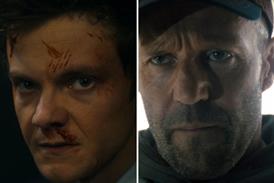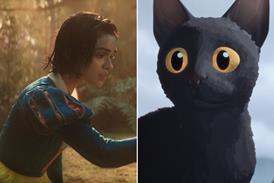
Algerian-French filmmaker Mounia Meddour’s third feature Délit de Solidarité is among 35 projects to have secured Doha Film Institute (DFI) funding as part of its autumn 2021 grants round.
The drama, which is in development, revolves around a young woman living at a key crossing point for migrants on the Italian-French border. Its French title translates as “a crime of solidarity”.
The DFI previously supported Meddour’s debut feature Papicha which premiered to critical acclaim in Cannes Un Certain Regard. The filmmaker is currently finishing post-production on her second feature Houria.
Meddour is among 10 past grantees and 12 women with projects in the autumn round.
Further grantees include Syrian director Anas Khalaf for his feature The Photographer about a government photographer grappling with split loyalties in the early days of the country’s civil war in 2011. Khalaf previously won support for his last feature The Translator, co-directed with his partner Rana Kazkaz.
Buzzy projects by first-time recipients include sci-fi social drama Oum by French-Morrocan director Sofia Alaoui, the hybrid documentary The Mother of All Lies by Moroccan documentarian Asmae El Moudir and Egyptian filmmaker Ahmed Fawzi-Saleh’s Hamlet From The Slums [pictured]. Fawzi-Saleh’s 2018 drama Poisonous Roses was Egypt’s entry to the 2020 Academy Awards.
The 35 selections, spanning feature and short narratives, documentaries and experimental works, are drawn principally from across the Middle East and North Africa, hailing from Algeria, Morocco, Egypt, Lebanon, Mauritania, Palestine, Yemen and Syria.
There are also nine international projects from outside the region from Costa Rica, Croatia, Djibouti, France, Indonesia, Iran, Myanmar, and Serbia.
A further eight projects by Qatari talents have also received funding including documentary feature When the News Break You by Hamad Al Hajri.
“With the sweeping challenges that emerging film talents face in the current environment, we believe it is our responsibility to further step up our support to ensure that their cinematic aspirations are realised,” said DFI CEO Fatma Hassan Alremaihi. “These film projects serve more than a creative purpose: They are bridges for the world to better understand the Arab world.”
2021 spring grants recipients (synopses provided by DFI)
MENA - Feature Narrative - Development
- Délit de Solidarité (Algeria) by Mounia Meddour presents the story of Ariane, who lives in the Roya Valley, a strategic point for migrants to cross the border between Italy and France.
- The Photographer (Syria) by Anas Khalaf is about a photographer working in a unique position at the heart of the Syrian government during the revolution in 2011, who decides to defect.
MENA - Feature Documentary - Development
- My Dream to Fly (Egypt) by Asmaa Gamal is an immersive portrait of a group of young people from the crowded slums of Cairo who escape their daily hardships on motorcycles by night.
- Those Who Watch Over (Morocco) by Karima Saïdi is about people buried in their host country and also their loved ones, who set up a new relationship with them, in Brussels—in a unique cemetery.
MENA - Feature Documentary - Production
- When the News Break You (Qatar) by Hamad Al Hajri, is about Arab journalists who have been in the eye of the storm for decades because interstate and intrastate conflicts have been an enduring and poignant characteristic of the region.
- Broken Dreamland (Morocco) by Khalid Laboudi and Hannu-Pekka Vitikaine is about three young Moroccan men who were best friends in Finland until their life took a dramatic turn when one of them carried out a murderous attack in the city of Turku.
- The Missing Camel (Mauritania) by Cheikh N’diaye, tells the story of Cheikh, who wants to prove that he is the descendant of a Senegalese king who fought French settlers.
MENA - Feature Narrative - Production
- All That the Wind Can Carry (Egypt) by Maged Nader depicts the story of Susana, whose ailing memory becomes fragments and shifting collages of pictures, home videos, and daily life encounters,
- Oum (Morocco) by Sofia Alaoui is a mystical journey in contemporary Morocco—between social drama and science fiction.
- Hamlet from the Slums (Egypt) by Ahmed Fawzi-Saleh presents the story of Sufi Ahmed, who has to face the rigid patriarchal world of his slum and challenge the status quo after his dead father appears to him.
- Perfumed with Mint (Egypt) by Muhammed Hamdy, shows a band of old friends who reunites in a nightmare. Mint sprouts out of their bodies, while photographs of people who lived there are scattered everywhere.
MENA - Feature Documentary – Post-Production
- The Mother of All Lies (Morocco) by Asmae El Moudir is about a young Moroccan woman’s search for truth that tangles with a web of lies in her family’s history.
MENA - Feature Experiment – Post-Production
- The Outlandish (Algeria) by Tahar Kessi follows the journeys of three characters through Algeria and meet its people, questions the country, the territory and the history.
- Fidai Film (Palestine) by Kamal Aljafari, is a sabotage film in response to the looting of Palestinian memories.
MENA - Feature Narrative – Post-Production
- The Dam (Lebanon) by Ali Cherri is about Maher, a seasonal worker, who toils in a traditional brickyard downstream from a dam in Sudan.
Non-MENA – Feature Documentary – Post-Production
- In A Year of Endless Days (Croatia) director Renata Lučić returns to her village to visit her dad, who is—as most men in his town—abandoned by his wife and trying to reinvent himself in his late 50s.
- Another Spring (Serbia) by Mladen Kovacevic depicts the 1972 epidemic of smallpox in Yugoslavia, which remains one of its most inspiring chapters.
- Green Line (France) by Sylvie Ballyot documents the story of Fida, who decides to meet those fighters who frightened her as a child.
- Khmerica (France) by Antoine Guide is about Sokha, a Khmer-American. The son of Cambodian refugees, he grew up in the United States. He was deported back to Cambodia seven years ago, where he still feels like a foreigner.
- Midwives (Myanmar) by Snow Hnin Ei Hlaing narrates the story of two midwives—one Buddhist and one Muslim— who defy strict ethnic divisions to work side by side in a makeshift clinic in western Myanmar, providing medical services to the Rohingya of Rakhine State.
Non-MENA - Feature Narrative – Post-Production
- Autobiography (Indonesia) by Makbul Mubarak is about a timid housekeeper who diligently obeys his master until a seemingly minor affront sets in motion a violent chain of events.
- Domingo And The Mist (Costa Rica) by Ariel Escalante Meza is about Domingo, whose house is due to be expropriated to make way for the construction of a highway. But his land hides a secret—the ghost of his deceased wife visits him within the mist.
- Until Tomorrow (Iran) by Ali Asgari is about a single mother’s courage, which is tested when she resorts to desperate measures to hide her illegitimate child from her parents.
TV Series - Development
- Out of My Mind (Djibouti) by Mo Yusuf is about a struggling Somali writer living in Dubai who decides to become the stand-up comedian he always wanted to be.
- Why did the Bluesman Cross the Road? (Lebanon) by Meedo Taha narrates the story of a pair of Latinx-Arab mechanics escaping the truckyards of Dearborn to seek their fortunes as bluesmen in Detroit.
-
Sellers kick off EFM business early amid simmering market
























No comments yet